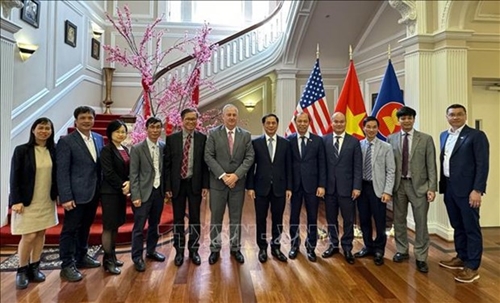In his speech, Son said that amidst latent traditional and non-traditional security challenges in the region, Vietnam consistently implements its foreign policy of independence, self-reliance, peace, friendship, cooperation and development, multilateralization and diversification of foreign relations, comprehensive and extensive international integration, and being a friend, a trusted partner and an active and responsible member of the international community.
In particular, the minister emphasized that Vietnam continues its bamboo diplomacy school of "solid roots, strong trunks, flexible branches" to respond to challenges and maintain a favorable diplomatic environment for national development, which is clearly reflected in the fact that to date, Vietnam has established a strategic partnership and comprehensive strategic partnership with all five permanent members of the United Nations Security Council.
    |
 |
|
Minister of Foreign Affairs Bui Thanh Son (sixth from right) and the Vietnamese working delegation pose for a photo with Jeffrey Goss, Associate Vice Provost/SE Asia at the Arizona State University (sixth from left) |
He said to achieve its set development targets, in addition to its efforts, activeness and self-reliance, Vietnam needs a peaceful, stable external environment and active cooperation and support from important partners, including the U.S. In that spirit, the minister affirmed that Vietnam always considers the U.S. as one of its most important partners.
To further deepen the Vietnam – U.S. comprehensive strategic partnership, Son said that the two countries need to increase the exchange of high-level and all-level delegations; promote political trust; continue focusing on economic - trade - investment cooperation; boost collaboration in science, technology and innovation, including the semiconductor ecosystem; consolidate people-to-people exchanges, educational and cultural cooperation; and coordinate more closely at multilateral forums and cooperation mechanisms such as the Association of Southeast Asian Nations (ASEAN), the United Nations, the Asia-Pacific Economic Cooperation (APEC) forum, and the Mekong - U.S. partnership.
Vietnam will also continue to improve the business environment, and create favorable conditions for foreign enterprises to invest and do business in the country, he emphasized.
Receiving several advisors and assistants of the U.S. Congress, Minister Son expressed his thanks to parliamentarians of both parties, notably Senators John McCain, John Kerry and Patrick Leahy, who always support Vietnam and Vietnam - U.S. relations. He proposed the U.S. Congress to maintain support for bilateral cooperation in various fields, including overcoming the consequences of war, economics, trade, education and training, science, technology, security, defense, and people-to-people exchanges.
The advisors and assistants appreciated Vietnam’s efforts to create a favorable environment for U.S. businesses to invest in the country, implement international commitments to respond to climate change, especially in the Mekong Delta region, and ensure human rights.
They affirmed the support of the two political parties in the U.S. Congress for bilateral relations as well as continued cooperation with Vietnam to contribute to further develop the bilateral ties in various fields in the spirit of the new relationship framework as well as in regional and international issues.
On this occasion, the Vietnamese foreign minister also received Jeffrey Goss, Associate Vice Provost/SE Asia at the Arizona State University, and had an online meeting with NVIDIA Vice President Keith Strier.
Source: VNA